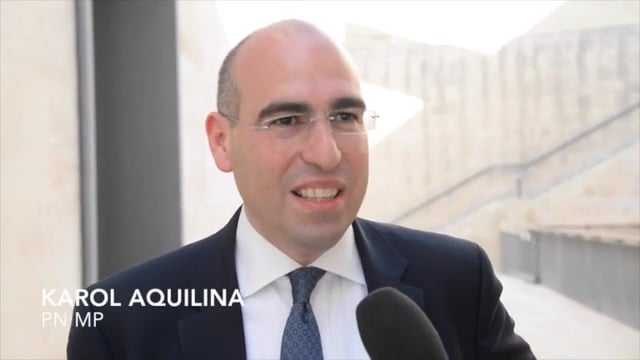[WATCH] PN MP: Marriage equality bill introduces uniformity worthy of 'communist state'
'The law will now give some the right to have their same-sex marriage recognised while at the same time, taking away the right for someone to be called a husband or a wife, or a father or a mother'


The Marriage Equality Bill - which will grant same-sex couples the right to marry - introduces uniformity worthy of "a communist state", according to Nationalist MP, Clyde Puli.
Parliament on Monday began its second reading of the Marriage Equality bill, which looks set to become law before Parliament breaks off for the summer recess.
The Opposition has stated that it would be voting in favour of the bill, in contrast to the civil unions vote back in 2014, when it abstained.
While the party has made its position clear, many close to the party have voiced concern at the decision, with media reports citing unnamed Opposition MPs stating they were not comfortable voting in favour and preferring to be given a free vote in parliament.
One issue that was of concern to a number of MPs who spoke to MaltaToday before Monday’s parliamentary session, was the use of neutral terms, such as spouse instead of the term husband or wife.
“The law will now give some the right to have their same-sex marriage recognised while at the same time, taking away the right for someone to be called a husband or a wife, or a father or a mother,” Puli said. He argued that while striving for equality was positive, the bill introduced a “perverse” way of recognising equality.
“The government confuses equality with uniformity,” said Puli. “[The removal of these terms introduces] a level of uniformity that is worthy of a communist country.”
According to Puli, equality should mean working towards “real diversity”, rather than making “all people the same”.
Despite his reservations, Puli said however that he was in agreement with the basic principle of the law.
The Opposition’s justice spokesperson Jason Azzopardi voiced similar concerns, describing the use of neutral language as an aberration.
Asked whether he agreed with the bill, Azzoapardi said this would ultimately depend on whether the government accepted the changes recommended by the Opposition.
“I think it is clear that removing the concept of maternity and paternity from our laws is an aberration,” he said. “It’s not logical.”
Others seemed less concerned with the wording of the bill. Parliamentary newcomer Karol Aquilina said he agreed with the bill since the Nationalist Party had also in its electoral manifesto pledged to introduce the law.
“Naturally one can discuss the details so that the law can be improved,” he added.
This was echoed by deputy leader Beppe Fenech Adami who said that he would be voting for the bill.
“We agree with the principle, but there will be some amendments we will be putting forward,” he said.
Karl Gouder, Parliament’s only openly-gay MP, said that while he was in agreement with the law, he too felt that there were some amendments that needed to be made for the law to be better and for it to “respect public opinion”.
Meanwhile, Partit Demokratiku leader and Nationalist MP Marlene Farrugia chose to focus more on the positive aspects of the bill.
“I agree with it,” said Farrugia. “There are some minor issues and we can discuss ways of improving the law at the committee stage, the possibility of ending discrimination and having everyone being considered as equal in our society is a step we need to take.”
MP Chris Said, who is contesting for the party’s a leadership, was curt with his response, insisting that he was “in favour of the Nationalist Party’s position”. Similarly, Opposition whip David Agius, said he would be expressing his views in parliament.
MP Stephen Spiteri said the PN parliamentary group had decided it would be voting in favour of the law. When pressed on whether he agreed with the spirit of the law he insisted that there was nothing to agree with, and the PN would be voting in favour.
Hermann Schiavone, another of the newcomers on the Opposition benches insisted he was obliged to comply with the Opposition’s whip when asked.
“The party’s position is clear, there is government whip to consider and I must abide by what he says,” said Schiavone.
















.jpg)






